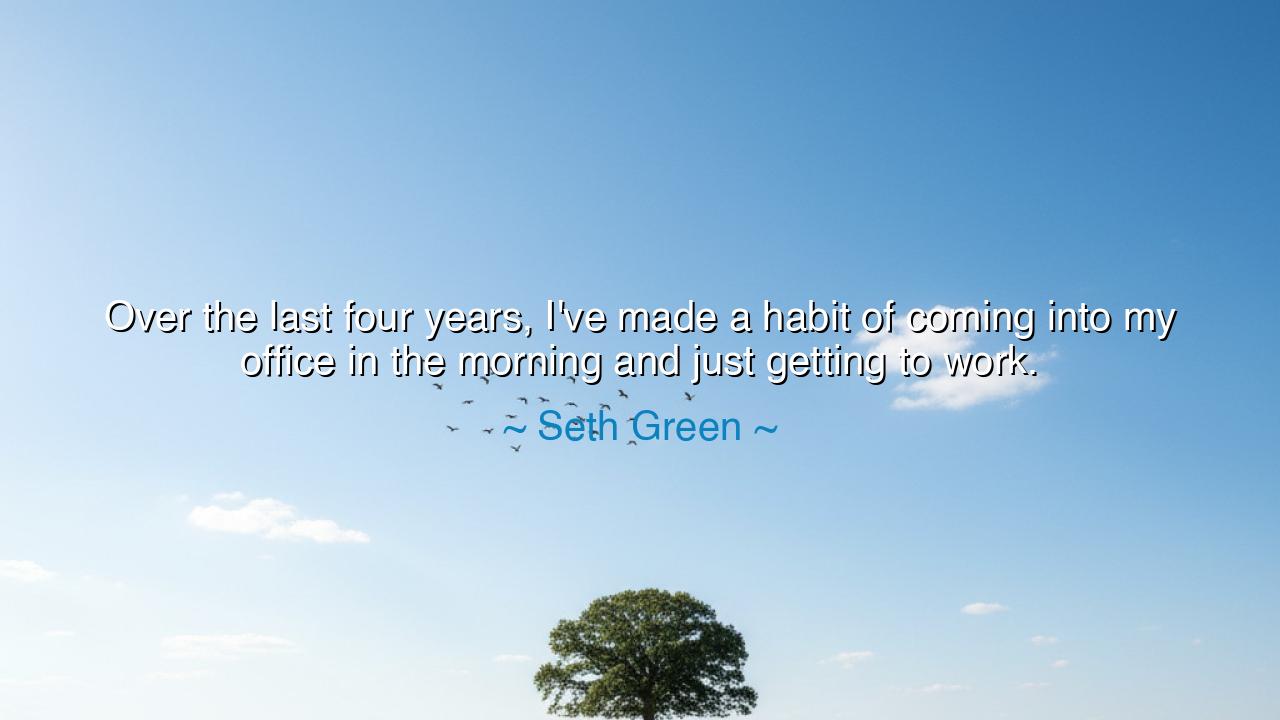
Over the last four years, I've made a habit of coming into my
Over the last four years, I've made a habit of coming into my office in the morning and just getting to work.






Hear the words of Seth Green, who spoke with the clarity of discipline: “Over the last four years, I’ve made a habit of coming into my office in the morning and just getting to work.” At first, this may seem an ordinary statement, a mere description of routine. Yet in truth it contains the marrow of wisdom: that greatness is not born of inspiration alone, nor of fleeting bursts of energy, but of habit, of the quiet, relentless rhythm of showing up each day and laboring with purpose.
The meaning of this saying is profound. To “just get to work” is to conquer the greatest enemy of creation: delay. The human mind is ever tempted by distraction, by the illusion that tomorrow is better suited for effort, or that brilliance arrives only in rare flashes. Yet Green reminds us that progress is built not in dreams alone but in discipline, in the decision to begin without excuse. The morning hour is sacred, for in it lies the opportunity to shape the day before the chaos of the world arrives.
The origin of this wisdom lies deep in the traditions of old. The Stoics taught that discipline in daily practice was the path to virtue. Marcus Aurelius, emperor of Rome, wrote to himself: “At dawn, when you wake unwillingly, let this thought be present: I am rising to do the work of a man.” Centuries before Green, Marcus knew the truth: that the act of rising and working is itself victory over weakness. Likewise, monks in cloisters, samurai in training halls, and artists in their studios all built greatness through the constancy of habitual labor.
Consider the story of Leonardo da Vinci, who filled his notebooks with thousands of sketches, calculations, and studies. Few of these pages were masterpieces in themselves, yet together they formed the foundation of genius. What the world remembers as brilliance was, in truth, the fruit of daily effort, of countless mornings in which he “just got to work.” Like Leonardo, Green reveals that habit, not chance, prepares the soil in which inspiration blooms.
The lesson for us is plain: do not wait for the perfect moment to act, for such a moment never comes. Begin where you are, with what you have, and trust that consistency will forge excellence. The power of habit is greater than the power of fleeting bursts of passion. By showing up daily, by devoting the sacred hours of morning to labor, you shape your destiny in silence, until one day the world beholds the fruit of your perseverance.
Practical actions must follow. Choose one place as your “office”—whether it be a desk, a studio, or a corner of your room. Each morning, without delay, sit down and begin. Do not wait for motivation to arrive; let habit be your guide. Over time, the act of beginning will become natural, and what once felt like effort will become second nature. Guard this habit as sacred, for it is the foundation of all accomplishment.
And so, child of tomorrow, remember Seth Green’s simple yet mighty wisdom. “Just getting to work” is no small thing—it is the root of greatness. The morning is a gift; do not waste it in hesitation. Begin, and begin again, until the habit itself carries you forward. For the river of success is not carved in a single surge, but by the steady flow of water across stone, day after day, year after year. So rise, enter your office, and set your hands to the task—for in this lies the true path to mastery.






AAdministratorAdministrator
Welcome, honored guests. Please leave a comment, we will respond soon